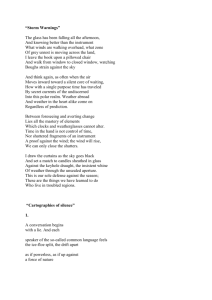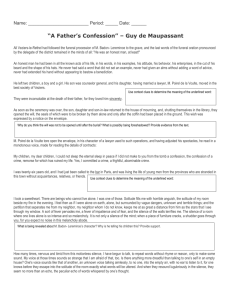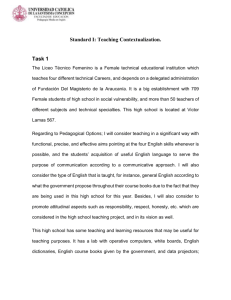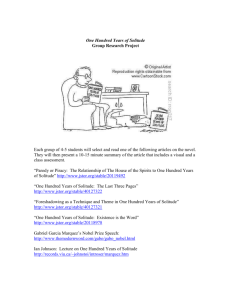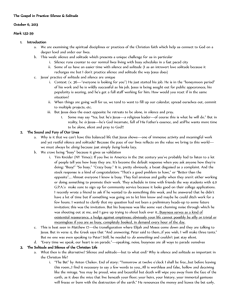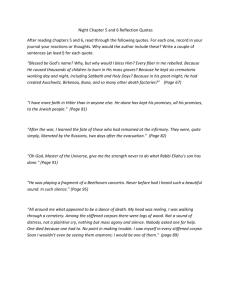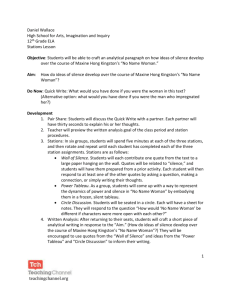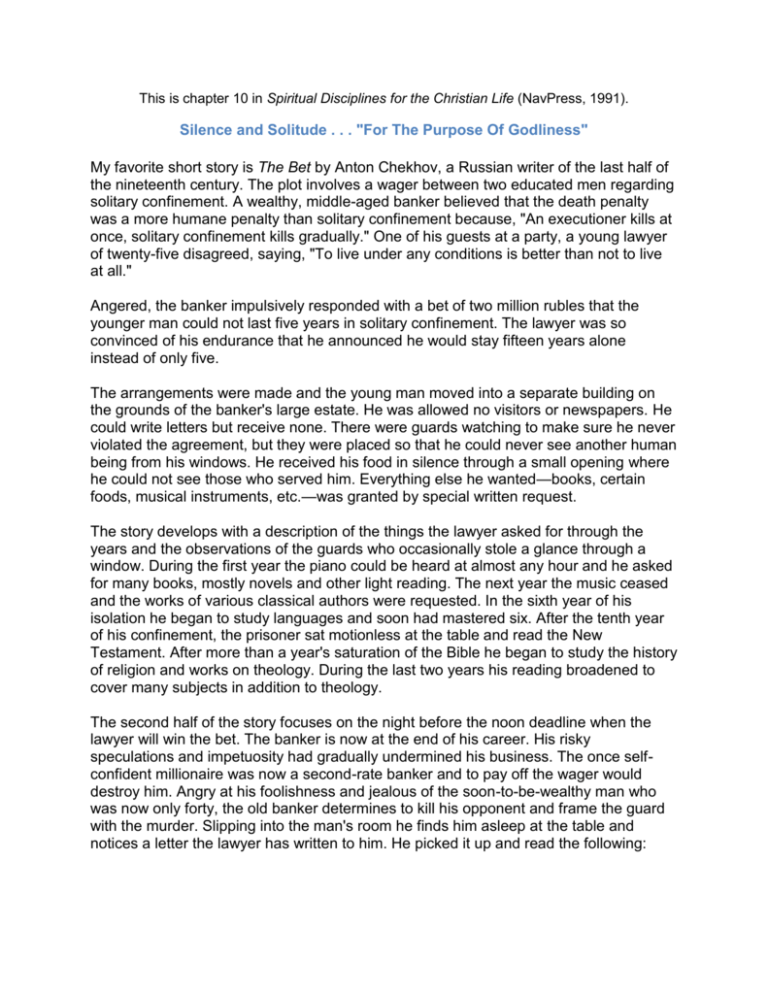
This is chapter 10 in Spiritual Disciplines for the Christian Life (NavPress, 1991).
Silence and Solitude . . . "For The Purpose Of Godliness"
My favorite short story is The Bet by Anton Chekhov, a Russian writer of the last half of
the nineteenth century. The plot involves a wager between two educated men regarding
solitary confinement. A wealthy, middle-aged banker believed that the death penalty
was a more humane penalty than solitary confinement because, "An executioner kills at
once, solitary confinement kills gradually." One of his guests at a party, a young lawyer
of twenty-five disagreed, saying, "To live under any conditions is better than not to live
at all."
Angered, the banker impulsively responded with a bet of two million rubles that the
younger man could not last five years in solitary confinement. The lawyer was so
convinced of his endurance that he announced he would stay fifteen years alone
instead of only five.
The arrangements were made and the young man moved into a separate building on
the grounds of the banker's large estate. He was allowed no visitors or newspapers. He
could write letters but receive none. There were guards watching to make sure he never
violated the agreement, but they were placed so that he could never see another human
being from his windows. He received his food in silence through a small opening where
he could not see those who served him. Everything else he wanted—books, certain
foods, musical instruments, etc.—was granted by special written request.
The story develops with a description of the things the lawyer asked for through the
years and the observations of the guards who occasionally stole a glance through a
window. During the first year the piano could be heard at almost any hour and he asked
for many books, mostly novels and other light reading. The next year the music ceased
and the works of various classical authors were requested. In the sixth year of his
isolation he began to study languages and soon had mastered six. After the tenth year
of his confinement, the prisoner sat motionless at the table and read the New
Testament. After more than a year's saturation of the Bible he began to study the history
of religion and works on theology. During the last two years his reading broadened to
cover many subjects in addition to theology.
The second half of the story focuses on the night before the noon deadline when the
lawyer will win the bet. The banker is now at the end of his career. His risky
speculations and impetuosity had gradually undermined his business. The once selfconfident millionaire was now a second-rate banker and to pay off the wager would
destroy him. Angry at his foolishness and jealous of the soon-to-be-wealthy man who
was now only forty, the old banker determines to kill his opponent and frame the guard
with the murder. Slipping into the man's room he finds him asleep at the table and
notices a letter the lawyer has written to him. He picked it up and read the following:
Tomorrow at twelve o'clock I shall be free, . . . but before leaving this room, . . . I find it
necessary to say a few words to you. With a clear conscience, and before God, who
sees me, I declare to you that I despise freedom and life and health and all that your
books call the joys of this world. For fifteen years I have studied attentively the life of
this world. It is true that I neither saw the earth nor its peoples, but in your books I lived.
. . . I sang songs, I hunted the deer and the wild boar in the forests. . . . In your books I
climbed to the summit of Elburz and Mont Blanc, and I saw from those heights the sun
rise in the morning, and at night it shed its purple glow over the sky and the ocean and
the mountain-tops. I saw beneath me the flashing lightning cut through the clouds. I saw
green fields, forests, rivers, lakes and towns. I heard the song of the sirens and the
music of the shepherd's reed-pipes. I felt the touch of the wings of beautiful [angels]
who had flown to me to talk about God. . . . Your books gave me wisdom. All that had
been achieved by the untiring brain of man during long centuries is stored in my brain in
a small compressed mass. . . . I know I am wiser than you all. . . . And I despise all your
books, I despise all earthly blessings and wisdom. All is worthless and false, hollow and
deceiving like the mirage. You may be proud, wise and beautiful, but death will wipe you
away from the face of the earth, as it does the mice that live beneath your floor; and
your heirs. your history, your immortal geniuses will freeze or burn with the destruction
of the earth. You have gone mad and are not following the right path. You take
falsehood for truth, and deformity for beauty. To prove to you how I despise all that you
value I renounce the two millions on which I looked, at one time, as the opening of
paradise for me, and which I now scorn. To deprive myself of the right to receive them, I
will leave my prison five hours before the appointed time, and by so doing break the
terms of our compact.
The banker read these lines, replaced the paper on the table, kissed the strange,
sleeping man and with tears in his eyes quietly left the house. Chekhov writes, "Never
before, not even after sustaining serious losses on change, had he despised himself as
he did at that moment." His tears kept him awake the rest of the night. And at seven the
next morning he was informed by the watchman that they had seen the man crawl
through a window, go to the gate, and then disappear.1
I don't recommend that we separate ourselves in this way, and I don't affirm all the
lawyer's conclusions, but I do believe Chekhov looks into a room where every Christian
sometimes dreams of living.
There is something both appealing and transforming about silence and solitude. Other
than Jesus Christ, perhaps the greatest men under each Covenant—Moses and Paul—
were both transformed through years in virtual isolation in a remote wilderness. And
there are moments in our pressure-cooker days when years of escape to some hidden
place sounds wistfully compelling to the Christian spirit.
When we think with balance we realize that it would be neither right nor desirable to be
cloistered from our God-given responsibilities involving other people. Biblical reality calls
us to family, fellowship, evangelism, and ministry for the sake of Christ and His
kingdom. And yet through the Holy Spirit, "deep calls to deep" (Psalm 42:7) in such a
way that there is a part of our spirit that craves silence and solitude. Just as we must
engage with others for some of the Disciplines of the Christian life, so there are times
when we must temporarily withdraw into the Disciplines of silence and solitude. In this
chapter we will explore what these twin Disciplines are, find Biblical reasons for
practicing them, and conclude with some sensible suggestions for starting.
EXPLANATION OF SILENCE AND SOLITUDE
The Discipline of silence is the voluntary and temporary abstention from speaking so
that certain spiritual goals might be sought. Sometimes silence is observed in order to
read, write, pray, etc. Though there is no outward speaking, there are internal dialogues
with self and with God. This can be called "outward silence." Other times silence is
maintained not only outwardly but also inwardly so that God's voice might be heard
more clearly.
Solitude is the Spiritual Discipline of voluntarily and temporarily withdrawing to privacy
for spiritual purposes. The period of solitude may last only a few minutes or for days. As
with silence, solitude may be sought in order to participate without interruption in other
Spiritual Disciplines, or just to be alone with God.
Three brief thoughts before proceeding in depth. First, think of silence and solitude as
complementary disciplines to fellowship. Without silence and solitude we're shallow.
Without fellowship we're stagnant. Balance requires them all.
Second, silence and solitude are usually found together. Though they can be
distinguished, in this chapter we will think of them as a pair.
Third, recognize that Western culture conditions us to be comfortable with noise and
crowds, not with silence and solitude. In her book, Living the Christ-centered Life
Between Walden and the Whirlwind , Jean Fleming observes, "We live in a noisy, busy
world. Silence and solitude are not twentieth-century words. They fit the era of Victorian
lace, high-button shoes, and kerosene lamps better than our age of television, video
arcades, and joggers wired with earphones. We have become a people with an
aversion to quiet and an uneasiness with being alone".2 Therefore be careful not to let
the world prejudice you against the Biblical witness on these matters. "He who has ears
to hear, let him hear" (Matthew 11:15).
VALUABLE REASONS FOR SILENCE AND SOLITUDE
There are many Biblical reasons for making priorities of the Disciplines of silence and
solitude.
To follow the example of Jesus
The Scriptures teach that Jesus practiced silence and solitude. Note these four
references:
1. Matthew 4:1, "Then Jesus was led up by the Spirit into the wilderness to be tempted by
the devil." The Holy Spirit led Jesus into this lengthy period of fasting and solitude. In
Luke's account of this experience, it's interesting to observe that he says Jesus was "full
of the Holy Spirit" (Luke 4:1) when He was led into this particular Discipline, but that
afterward He returned to Galilee "in the power of the Spirit" (Luke 4:14).
2. Matthew 14:23, "And after He had sent the multitudes away, He went up to the mountain
by Himself to pray; and when it was evening, He was there alone." He sent both the
seeking multitudes and His disciples away so He could be alone with the Father.
3. Mark 1:35, "And in the early morning, while it was still dark, He arose and went out and
departed to a lonely place, and was praying there." The previous verses tell us that after
dark "the whole city" gathered at the door of the house where Jesus was staying. There
He healed many people and cast out demons. But before it was daylight again, He went
to spend time alone. Jesus knew that had He waited until the morning hours He could
never have had time for silence and solitude.
4. Luke 4:42, "And when day came, He departed and went to a lonely place; and the
multitudes were searching for Him, and came to Him, and tried to keep Him from going
away from them." Put yourself in Jesus' sandals for a moment. People are clamoring for
your help and have many real needs. You are able to meet all those needs. Can you
ever feel justified in pulling away to be alone? Jesus did. We love to feel wanted. We
love the sense of importance/power/indispensability (pick one) that comes from doing
something no one else can do. But Jesus did not succumb to those temptations. He
knew the importance of disciplining Himself to be alone.
By now the point should be obvious: to be like Jesus we must discipline ourselves to
find times of silence and solitude. The reason we must do this is to find spiritual strength
through these Disciplines as Jesus did.
To hear the voice of God better
One of the more obvious reasons for getting away from earthly noise and human voices
is to hear the Voice from Heaven better. Biblical examples of this which come to mind
include Elijah going to Mt. Horeb where he heard the gentle whisper of God's voice (1
Kings 19:11-13), Habakkuk standing on the guard post and keeping watch to see what
God would say to him (Habakkuk 2:1), and Paul going away to Arabia after his
conversion so he could be alone with God (Galatians 1:17).
Of course it isn't absolutely necessary to get far away from noises and people in order
to hear God speak, otherwise we'd never perceive His promptings in the course of
everyday life, or even in peopled worship services. But there are times to eliminate the
voices of the world in order to hear undistracted the voice of God.
According to Jonathan Edwards, this was a secret of the Godliness of his wife Sarah. In
his first record of her, penned while his future wife was still a teenager, he wrote, "She
hardly cares for anything, except to meditate on Him. . . . She loves to be alone, walking
in the fields and groves, and seems to have someone invisible always conversing with
her."4 Where Sarah had "fields and groves," we may have to walk in the park, around
the block, or find another place for regular solitude. Wherever it is, we need to find a
place to be alone to hear the voice of Him whose presence is unseen yet more real than
any other.
Many of us need to realize the addiction we have to noise. It's one thing to turn on the
TV, tape, or radio to listen to while ironing or doing other chores, but it's another thing
habitually to turn one of these on immediately upon entering a room just to have sound.
Even worse is to feel that it's necessary to have background noise during Bible intake or
prayer. I believe the convenience of sound has contributed to the spiritual shallowness
of contemporary western Christianity. The advent of affordable, portable sound
systems, for instance, has been a mixed blessing. The negative side is that now we
don't have to go anywhere without human voices. As a result we are less frequently
alone with our own thoughts and God's voice. Because of this, and because we are the
most urban, noise-polluted generation ever, we have an unprecedented need to learn
the Disciplines of silence and solitude.
To express worship to God
The worship of God does not always require words, sounds, or actions. Sometimes
worship consists of a God-focused stillness and hush. Scriptural precedent for this
includes texts like Habakkuk 2:20: "But the Lord is in His holy temple. Let all the earth
be silent before Him," Zephaniah 1:7: "Be silent before the Lord God!", and Zechariah
2:13, "Be silent, all flesh, before the Lord." It's not just a silence that's enjoined, but a
silence "before Him," "before the Lord God!", "before the Lord." That's the silence of
worship. There are times to speak to God and there are times simply to behold and
adore Him in silence.
Recorded in the journals of George Whitefield is an incident of silent worship which he
once had in the solitude of his home. He wrote that in the experience "God was pleased
to pour into my soul a great spirit of supplication, and a sense of His free, distinguishing
mercies so filled me with love, humility, and joy and holy confusion that I could at last
only pour out my heart before Him in an awful silence. I was so full that I could not well
speak.5
Worshiping God in silence may occur because your heart, like Whitefield's here, is so
full that words cannot express your love for Him. At other times you may feel just the
opposite, so passionless that any words seem hypocritical. Regardless of the state of
your emotions, there is always a place for wordless worship.
To express faith in God
The simple act of silence before the Lord, as opposed to coming to Him in a wordy fret,
can be a demonstration of faith in Him.
Twice in Psalm 62 David displays this kind of faith. In verses 1-2 he affirms, "My soul
waits in silence for God only; from Him is my salvation. He only is my rock and my
salvation, my stronghold; I shall not be greatly shaken." Then in verses 5-6 he says
again, "My soul, wait in silence for God only, for my hope is from Him. He only is my
rock and my salvation, my stronghold; I shall not be shaken."
A favorite verse of many, Isaiah 30:15, connects silence before God with faith in Him:
"For thus the Lord God, the Holy One of Israel, has said, 'In repentance and rest you
shall be saved, in quietness and trust is your strength.'" Faith is frequently expressed
through prayer. But sometimes it is exhibited through a wordlessness before the Lord
which, by its quiet absence of anxiety, communicates trust in His sovereign control.
I discovered a real-life illustration of this in the life of the early American missionary to
the Indians, David Brainerd. He wrote in his journal on Wednesday, April 28, 1742,
I withdrew to my usual place of retirement in great peace and tranquility; spent about
two hours in secret duties and felt much as I did yesterday morning, only weaker and
more overcome. I seemed to depend wholly upon my dear Lord, wholly weaned from all
other dependences. I knew not what to say to my God, but only lean on His bosom, as it
were, and breathe out my desires after a perfect conformity to Him in all things.
Thirsting desires and insatiable longings possessed my soul after perfect holiness. God
was so precious to my soul that the world with all its enjoyments was infinitely vile. I had
no more value for all the favor of men than pebbles. The Lord was my ALL; and that He
overruled all greatly delighted me. I think my faith and dependence upon God scarce
ever rose so high. I saw Him such a fountain of goodness that it seemed impossible I
should distrust Him again, or be any way anxious about anything that should happen to
me.6
We may not be able to express ourselves in a journal as well as Brainerd, but we can
express our faith to God in ways He thinks are beautiful through seasons of eloquent
silences.
To seek the salvation of the Lord
A time of silence and solitude to seek the salvation of the Lord can refer either to a nonChristian seeking salvation from sin and guilt in Christ, or it can apply to a believer
seeking God's salvation from certain circumstances. The words of Jeremiah in
Lamentations 3:25-28 are appropriate in either case: "The Lord is good to those who
wait for Him, to the person who seeks Him. It is good that he waits silently for the
salvation of the Lord. It is good for a man that he should bear the yoke in his youth. Let
him sit alone and be silent since He has laid it on him. Let him put his mouth in the dust,
perhaps there is hope."
In a sermon on this text, C. H. Spurgeon said of this method of seeking God:
I commend solitude to any of you who are seeking salvation, first, that you may study
well your case as in the sight of God. Few men truly know themselves as they really
are. Most people have seen themselves in a looking-glass, but there is another lookingglass, which gives true reflections, into which few men look. To study one's self in the
light of God's Word, and carefully to go over one's condition, examining both the inward
and the outward sins, and using all the tests which are given us in the Scriptures, would
be a very healthy exercise; but how very few care to go through it! 7
Since Spurgeon's day, some have apparently come to believe that the only time a
person will seriously seek salvation is during a postsermon hymn when there is the
sound of an organ or piano and a singing church congregation. We shouldn't minimize
the value of silence before God to help avoid distractions when considering the state of
the soul. Solitude and silence can help us come to grips with the realities of our sin,
death, judgment, etc., themes which are frequently drowned out of our consciousness
by sounds of everyday life. We need to encourage seekers more to get "alone with
God" and, in Spurgeon's words, "to study one's self in the light of God's Word."
To be physically and spiritually restored
Everyone has a regular need for restoring the resources of both the inward and outward
man. It was true even for those who lived most closely with Jesus.
After spending themselves in several days of physical and spiritual output, notice the
means of replenishment Jesus prescribed for His disciples, "Come away by yourselves
to a lonely place and rest a while" (Mark 6:31).
We all need times to unstring the bow of our routine stresses and enjoy the restoration
that silence and solitude can provide for our body and soul.
One evening in October 1982, I saw a news report about the life and recent death of
pianist Glenn Gould. He was described as a miraculous musician when he burst onto
the music scene as a teenager during the fifties. He toured the world and amazed
listeners with his skills. But in 1964 he quit playing in public. From then on, even though
he was one of the world's greatest pianists, Gould only played in private and for
recording. And even his recording sessions were done in complete privacy. He was
convinced that isolation was the only way to create. There's a monkishness about
Gould's practice we would not want to imitate completely. However, don't overlook the
physically and spiritually recreative qualities about silence and solitude which are deeply
therapeutic.
To regain a spiritual perspective
There's no better way to step back and get a more balanced, less worldly perspective
on matters than through the Disciplines or silence and solitude.
When Zacharias was told by the angel Gabriel that he and his elderly wife would
miraculously have a son, he doubted. In response Gabriel said, "And behold, you shall
be silent and unable to speak until the day when these things take place, because you
did not believe my words, which shall be fulfilled in their proper time" (Luke 1:20). And
what happened to Zacharias' perspective about these things during this time of enforced
silence? When the baby was born, Luke 1:63-64 says, "And he asked for a tablet, and
wrote as follows, 'His name is John.' And they were all astonished. And at once his
mouth was opened and his tongue loosed, and he began to speak in praise of God." A
negative illustration, perhaps, but it shows how closing our mouths can help us open our
minds.
One of the most famous and life-changing events in the life of Billy Graham happened in
August 1949. This was just before the Los Angeles crusade which thrust him into
national prominence. Many who weren't around at that time may not know that for a
short period the unofficial title of North America's most prominent evangelist fell upon a
man named Chuck Templeton. But by this time Templeton was coming under the
influence of men who doubted the inspiration of Scripture, and this eventually led to his
complete denial of the faith. He began to share the books and ideas that were shaping
him with Graham. And only days before Graham drove to California, Templeton told him
that by continuing to believe the Bible the young evangelist was committing intellectual
suicide.
While speaking at a youth conference in the San Bernardino Mountains, Graham knew
he had to get God's perspective on the matter, and he found it through solitude. Here's
how he describes that night: I went back alone to the cottage and read in my Bible for a
while, and then I decided to take a walk in the forest." There he recalled that phrases
such as "the Word of the Lord came," and "thus saith the Lord," were used more than
two thousand times in Scripture. He meditated on the attitude of Christ, who fulfilled the
law and the prophets, who quoted from them constantly and never indicated that they
might be wrong. As he walked he said, "Lord, what shall I do? What shall be the
direction of my life?" He saw that intellect alone couldn't resolve the question of the
Bible's inspiration and authority. Beyond that it ultimately became an issue of faith. He
thought of the faith he had in many everyday things that he did not understand, such as
airplanes and cars, and asked himself why it was only the things of the Spirit where
such faith was considered wrong. "So I went back and got my Bible," he continues, "and
I went out in the moonlight. And I got to a stump and put the Bible on the stump, and I
knelt down, and I said, 'Oh, God; I cannot prove certain things. I cannot answer some of
the questions Chuck is raising and some of the other people are raising, but I accept
this Book by faith as the Word of God'."8
And through that time of solitude and the spiritual perspective he gained that night, Billy
Graham was shaped into the man the world has known since.
Graham's experience demonstrates what the prolific Puritan theologian, John Owen,
said of our solitudes, "What we are in them, that we are indeed, and no more. They are
either the best or the worst of our times, wherein the principle that is predominant in us
will show and act itself."9
To seek the will of God
Perhaps one of the most common reasons believers have a time of silence and solitude
with God, at least on occasion, is to discern His will about a matter. Jesus did this in
Luke 6:12-13 when deciding whom to choose as the disciples who would travel with
Him: "And it was at this time that He went off to the mountain to pray, and He spent the
whole night in prayer to God. And when day came, He called His disciples to Him; and
chose twelve of them, whom He also named as apostles."
Christian history is rich with memorable stories of men and women who secluded
themselves from all others in order to seek the will of Him who matters most. A favorite
of these stories involves Hudson Taylor, a young, exhausted missionary to China. In
1865, while back in England to rest and continue some medical studies, he struggled
with a decision. He sensed that God might be leading him to start a new mission work to
do something no one else was doing—taking the Gospel to the vast, unreached millions
in the interior of China. For decades, almost all missionaries worked only in the coastal
cities, rarely going inland. But Taylor was fearful of leading such a great enterprise,
knowing that the burden of enlisting missionaries, as well as finding and maintaining
their financial support, would rest on his shoulders.
By the quiet summer Sunday of June 25, Hudson Taylor could stand the uncertainty no
longer. Worn out and ill, he had gone to rest with friends at Brighton. But instead of
enjoying their company he knew he must have silence and solitude, and he wandered
out along the sands left by the receding tide. Although the scene was peaceful, he was
in agony. A decision had to be made. He must know God's will. As he walked, the
thought came, "'Why, if we are obeying the Lord, the responsibility rests with Him, not
with us! Thou, Lord, Thou shalt have all the burden! At Thy bidding, as Thy servant I go
forward, leaving results with Thee.' 'How restfully I turned away from the sands,' he said,
recalling the deliverance of that hour. 'The conflict ended, all was joy and peace. I felt as
if I could fly up the hill to Mr. Pearse's house. And how I did sleep that night! My dear
wife thought Brighton had done wonders for me, and so it had.'" 10
And so, on the hinge of seeking His will through silence and solitude, God opened the
door for the China Inland Mission. And that same work continues to be used of God and
has grown into the Overseas Missionary Fellowship, one of the world's great missionary
endeavors.
God often makes His will clear to us in public, but there are times when He discloses it
only in private. To discover it requires the Disciplines of silence and solitude.
To learn control of the tongue
Learning to keep silent for extended periods of time can help us control our tongue all
the time.
There's no doubt that learning control of the tongue is critical to Christlikeness. The
Bible says that the religion of the person with no tongue control is worthless (James
1:26). Proverbs 17:27-28 relates the Christlike qualities of Godly knowledge,
understanding, and wisdom to the power to rein in words: "He who restrains his words
has knowledge, and he who has a cool spirit is a man of understanding. Even a fool,
when he keeps silent, is considered wise; when he closes his lips, he is counted
prudent."
There is Old Covenant precedent for disciplined seasons of solitary silence in
Ecclesiastes 3:7b which says there is "A time to be silent, and a time to speak."
Learning the Discipline of the former can help you develop control in the latter, for the
one who doesn't know how or when to be silent doesn't know how or when to speak.
In the New Testament, James 1:19 also indicates a relationship between learning
silence and learning control of the tongue: "But let everyone be quick to hear, slow to
speak and slow to anger."
How can the Disciplines of silence and solitude teach tongue control? On a long fast
you discover that much of the food you normally eat is really unnecessary. When you
practice silence and solitude, you find that you don't need to say many things you think
you need to say. In silence we learn to rely more on God's control in situations where
we would normally feel compelled to speak, or to speak too much. We find out that He
is able to manage situations in which we once thought our input was indispensable. The
skills of observation and listening are also sharpened in those who practice silence and
solitude so that when they do speak there's more of a freshness and depth to their
words.
In a final Scripture passage, James 3:2, we find this teaching: "For we all stumble in
many ways. If anyone does not stumble in what he says, he is a perfect man, able to
bridle the whole body as well." Practicing the Discipline of silence leads to
Christlikeness because it helps develop control of the tongue. And here we see that
control of the tongue promotes a Christlike control of "the whole body as well."
One reason why the dual Disciplines of silence and solitude can be so thoroughly
transforming is because they can help us with the other Spiritual Disciplines. They
should normally be a part, for example, of individual Bible intake and prayer. They are a
necessary component of private worship. In silence and solitude we can maximize time
for Disciplines such as learning and journaling. It's common to practice fasting during
times of silence and solitude. But more than anything else, the Disciplines of silence
and solitude can be so transfiguring because they provide time to think about life and to
listen to God. The plain fact is that most of us don't do that enough. Generations ago
most of our forebears would have spent their days working in the fields or in the home
where the only other sounds were those of nature or human voices. Without electronic
media there were fewer distractions from the voice of conscience and the still, small
voice of God. This is not to glamorize the supposed "good old days" (a sinful practice;
see Ecclesiastes 7:10) or suggest we try to return to them. I'm simply reaffirming what
we've said from the beginning of this chapter, that one of the costs of our technological
advancement is a greater temptation to avoid quietness. While we have broadened our
intake of news and information of all kinds, these advantages may come at the expense
of our spiritual depth if we do not practice silence and solitude.
Remember that the great purpose for engaging in these Disciplines is Godliness, that
we may be like Jesus, that we may be more holy. In The Still Hour, Austin Phelps wrote,
"It has been said that no great work in literature or in science was ever wrought by a
man who did not love solitude. We may lay it down as an elemental principle of religion,
that no large growth in holiness was ever gained by one who did not take time to be
often long alone with God.12
SUGGESTIONS FOR SILENCE AND SOLITUDE
Some people enjoy the Disciplines of silence and solitude like they enjoy reading or
watching some great adventure. Instead of developing these practices for themselves,
they enter into them only vicariously and admire them from afar. They dream about
these Disciplines, but they don't do them. Here is some practical help for making silence
and solitude more of a reality and habit.
Consecrate the occasional "minute retreats" each day for silence and solitude.
A Christian radio station in my area has a thirty-second spot emphasizing the benefits of
silence. Then it provides ten silent seconds to make its point. As simple as it sounds,
the impact of that unexpected quiet moment is remarkable.
It's possible to provide that same kind of refreshment on occasion throughout your day.
A moment at a traffic light, in an elevator, or in the line at the drive-thru bank can
become a "minute retreat" when you consecrate it as a time of silence and solitude. Use
the time of prayer at a meal for a spiritual pause. On the phone, see how quiet your
thoughts can become while on "hold."
I can't provide suggestions for every person's circumstances. But I can encourage you
to find ways to turn the routine into the holy, to find those "minute retreats" that can
punctuate and empower even the busiest days.
Of course, the key is not just taking a breath and settling down, as important as that is.
What I'm advocating is looking to Christ and listening to His Spirit. It's practicing what
we sing in the hymn, "Take my moments and my days, let them flow in ceaseless
praise." Seize these unexpected opportunities given you and concentrate exclusively on
Him and life in the Spirit. Even if you are provided with only a few seconds, even if it's
not an absolutely quiet or completely solitary place, enjoy the restoration found in the
conscious presence of Jesus Christ.
Set a goal of having a time each day for outward silence and solitude with the Lord.
Without exception, the men and women I have known who make the most rapid,
consistent, and evident growth in Christlikeness have been those who develop a daily
time of being alone with God. This time of outward silence is the time of daily Bible
intake and prayer. In this solitude is the occasion for private worship.
This daily devotional habit is not easy to develop because we lead busy lives and
because we have an enemy aware of the stakes involved. Missionary martyr Jim Elliot
knew of the battle: "I think the devil has made it his business to monopolize on three
elements: noise, hurry, crowds . . . Satan is quite aware of the power of silence."13 Our
days are usually filled with more than enough noise, plenty of hurry, and demanding
people. Unless we plan for daily times of solitary silence before God, these other things
will rush in to fill our time like water into the Titanic.
These daily times are the lifeblood of the Disciplines of silence and solitude. Those who
practice silence and solitude well on a daily basis are more likely to discipline
themselves to enjoy them on an occasional basis, such as on "minute retreats," the
Lord's Day, and on extended periods. The person who rarely exercises struggles with
both a brief climb up the stairs and a mile run. The one who jogs every day has no
trouble with either. In the same way the person who has a time of daily spiritual
exercises is the one who most enjoys both "minute retreats" and extended periods of
silence and solitude.
Try to get away for a few extended (half-day to overnight or longer) times yearly.
"Getting away" for an extended time of silence and solitude may be nothing more than
finding an empty room in your church in which to spend an afternoon, an evening, or a
Saturday. Or it may involve spending a night or a weekend at a retreat center, lodge, or
cabin.
On some of these getaways you may want to take nothing but your Bible and a
notebook. On other occasions you might want to devour a book you believe will have a
dramatic impact on your life. Such retreats are a good time to plan and evaluate your
goals.
If you've never spent an entire evening, half a day, or longer in silence and solitude, you
may be wondering what you would do with all that time. I would advise you to prepare a
schedule either in advance or first thing upon arrival, because you'll be surprised at how
quickly the time will pass. Don't feel as though you must stick slavishly to your schedule.
Even if it's not an overnight event, sleep if you need to. But a plan can help you use
your time for the intended purposes rather than inadvertently misspending it.
Although overnight getaways at distant places are wonderful, don't wait for times when
you can go like Elijah to Mt. Horeb for forty days before you start practicing silence and
solitude. Remember that, generally speaking, all the Spiritual Disciplines, including
these two, are intended for common practice in the places where we live our daily lives.
Locate special places which can be used for silence and solitude. Find them: within the
home, within walking distance, within a few minutes' drive, and for overnight or longer
retreats.
The prophetic Welsh preacher Howell Harris, a friend of George Whitefield, had a
special place for silence and solitude in a church building. Writing about the time before
the Welshman's evangelistic ministry, Whitefield's biographer, Arnold Dallimore, says,
Harris's knowledge of Divine things during these days was small. He simply knew he
loved the Lord and wanted to love Him more, and in this pursuit he sought out quiet
places where he could be secluded with Him in prayer. One of his favourite retreats was
the church at Llangasty—the village in which he then taught school—and on one
occasion shortly after his conversion he climbed into its tower to be more alone with the
Lord. There, as he remained in intercession for some hours, he experienced and
overwhelming sense of the presence and power of God. That lonely church tower
became to him a holy of holies, and afterwards he wrote, 'I felt suddenly my heart
melting within me, like wax before the fire, with love to God my Saviour; and also felt,
not only love and peace, but a longing to be dissolved with Christ. There was a cry in
my inmost soul which I was totally unacquainted with before, 'Abba, Father!' . . . I knew I
was His child, and that He loved and heard me. My soul being filled and satiated, cried,
'It is enough! I am satisfied! Give me strength and I will follow Thee through fire and
water.''14
As I already mentioned, you might locate a spot in your church's building as Howell
Harris did as your special place for silence and solitude.
Jonathan Edwards found solitude in an open field. While traveling on the Connecticut
River he recorded, "At Saybrook we went ashore to lodge on Saturday, and there kept
the Sabbath; where I had a sweet and refreshing season, walking alone in the fields."15
More commonly he retreated to the woods for silence and solitude with God: "I rode out
into the woods for my health, . . . having alighted from my horse in a retired place, as
my manner commonly has been, to walk for divine contemplation and prayer, . . ."16 You
may not live near fields or woods, but there may be a park not far away that could
provide a place to walk and think and pray with few distractions. A pharmacist in my
church with three young children frequently stops at a park two blocks from where he
lives for a few minutes of silence and solitude before going home in the evening. My
favorite spot is the Morton Arboretum near my home.
Dawson Trotman routinely walked to a knoll at the end of his street of which his
biographer says, "Here he spent precious hours alone, praying aloud, singing praise to
the Lord, quoting Scriptures of promise and challenge that flooded his mind—now
wrestling in urgent prayer, now pacing the hillside in silence."17 One of my best friends
takes the index cards which contain his prayer concerns and walks for blocks in his
neighborhood while silently pouring his heart out before God.
Susanna Wesley, mother of John and Charles, had a very large family and for many
years times of physical isolation were scarce. It is well known that when she needed
silence and solitude she would bring her apron up over her head and read her Bible and
pray underneath it. Obviously that did not block out all noise, but it was a sign to her
children that for those minutes she was not to be bothered and the older ones were to
care for the younger.
Like Susanna Wesley's, your place may not be ideal, and it may have to change from
time to time, but it is possible to locate some singular spot for you to pursue Godliness
through silence and solitude. Where is your special place?
Arrange a trade-off system of daily responsibilities with your spouse or a friend when
necessary in order to have the freedom for extended times of silence and solitude.
Your initial response to the suggestion of extended times in these Disciplines may have
been, "You don't know my situation! I have a family to feed and take care of. I can't just
leave them and go off by myself for hours at a time." Most people, including those who
practice silence and solitude, have similar obligations which can't be neglected. The
most practical, inexpensive method of overcoming this problem is to ask your spouse or
a friend to temporarily assume your responsibilities in order to give you time alone.
Then return the favor by providing the same or another service. Mothers of young
children tell me this is the best, most workable way they've found for getting extended
time for these Disciplines.
One word of warning: the reality of the routine can hit especially hard when you come
home again. A mother of five who told me she cushions the shock by preparing a meal
in advance in a crockpot or for the microwave. If things are disorderly around the home
when she returns, she can make her adjustment without having to worry about cooking
right away. As tough as it is sometimes to come back, the rigors of reality only prove
how much we need the refreshment of silence and solitude.
MORE APPLICATION
Will you seek for daily times of silence and solitude? When Solomon's Temple was
erected with "neither hammer nor axe nor any iron tool heard in the house while it was
being built," (1 Kings 6:7), so our personal temple of the Holy Spirit (1 Corinthians 6:19)
needs to be built up with interludes of silence and solitude. Schedule such a retreat for
every day. The busier you are, the more hectic your world, the more you need to plan
daily spaces of silence and solitude.
A. W. Tozer expanded on this by saying,
Retire from the world each day to some private spot, even if it be only the bedroom (for a while I
retreated to the furnace room for want of a better place). Stay in the secret place till the
surrounding noises begin to fade out of your heart and a sense of God's presence envelopes
you. . . . Listen for the inward Voice till you learn to recognize it. Stop trying to compete with
others. Give yourself to God and then be what and who you are without regard to what others
think. . . . Learn to pray inwardly every moment. After a while you can do this even while you
work. . . . Read less, but more of what is important to your inner life. Never let your mind remain
scattered for very long. Call home your roving thoughts. Gaze on Christ with the eyes of your
soul. Practice spiritual concentration. All the above is contingent upon a right relation to God
through Christ and daily meditation on the Scriptures. Lacking these, nothing will help us;
granted these, the discipline recommended will go far to neutralize the evil effects of externalism
and to make us acquainted with God and our own souls.18
As sleep and rest are needed each day for the body, so silence and solitude are needed
each day for the soul. These Disciplines have a way of airing out the mind and ironing
out the wrinkles of the soul. Plan to come to the quiet every day to meet God in His
Word and through prayer.
Will you seek for extended times of silence and solitude? Plan for them. Put them
on the calendar. The routine and responsibilities of daily living will expand to fill all your
time and keep you from spending protracted periods alone with God unless you act
decisively.
You may need an extended time to settle your doubts or reestablish your spiritual
moorings. That's what the late Francis Schaeffer did during a critical period of silence
and solitude in 1951. He came to a crisis about reality that had two parts. He described
his struggle this way: "First, it seemed to me that among many of those who held the
orthodox position one saw little reality in the things that the Bible so clearly said should
be the result of Christianity. Second, it gradually grew on me that my own reality was
less than it had been in the early days after I had become a Christian. I realized that in
honesty I had to go back and rethink my whole position."19
This was a crisis important enough for extended times of silence and solitude. Of this
period of days and days he said, "I walked in the mountains when it was clear and when
it was rainy I walked back and forward in the hayloft of the old chalet where we lived. I
walked, prayed, and thought through what the Scriptures taught as well as reviewing my
own reasons for being a Christian."20 Gradually he began to see that his problem was a
lack of understanding about what the Bible says about the meaning of the finished work
of Christ for our present lives. And gradually, Schaeffer said, the sun came out again
and the song came back. Those days of silence and solitude were a major turning point
in his life and the foundation upon which the rest of his unique and now-famous ministry
in L'Abri, Switzerland was built.
Perhaps you need to get alone with God and deal with some doubts and questions.
Maybe you have come to a crisis of faith which needs time for prayer, deep thinking and
much soul-searching. There's too much at stake to neglect the matter or to deal with it
superficially. If your body had an emergency you would take the necessary time to deal
with it. Don't do any less for an emergency of the soul.
But don't think of extended periods of silence and solitude as times only for dealing with
doubts or for spiritual urgent care. The memoir of the first missionary from America,
Adoniram Judson, tells this story:
Once, when worn out with translations, and really needing rest, he went over the hills
into the thick jungle, far beyond all human habitation, . . . To this place he brought his
Bible, and sat down under the wild jungle trees to read, and meditate, and pray, and at
night returned to the 'hermitage' [a bamboo house he'd built at the edge of the jungle]. 21
Judson spent an incredible forty days like this in the dangerous jungle of Burma. But of
this lifestyle, we are told, "He only adopted it for a time." Why would he break his routine
for this prolonged period of silence and solitude? His biographer says it was "as a
means of moral improvement by which the whole of his future life might be rendered
more in harmony with the perfect example of the Saviour whom he worshipped." 22
Judson engaged in his extended time of silence and solitude for purposes of rest, his
future usefulness, and "for the purpose of Godliness." Shouldn't you seek to do the
same (even though forty hours may be more realistic for you than forty days)?
Will you start now? The time for silence and solitude will rarely be easy to chisel out of
your schedule. The world, the flesh, and the enemy of your soul will see to that. But if
you will discipline yourself to do it, your only regret will be that you didn't start sooner.
Don't expect each time of silence and solitude to be a landmark occasion in your life as
some of those quoted here from Christian history have been in the lives of those people.
There are not always dramatic results or intense emotions involved. More often than not
they are emotionally simple and serene. However, as with all the Spiritual Disciplines,
silence and solitude are profitable even though sometimes you conclude them feeling
"normal," or even dry. Why not begin these refreshing Disciplines now?
These words from Jonathan Edwards are an appropriate concluding reminder:
Some are greatly affected when in company; but have nothing that bears any manner of
proportion to it in secret, in close meditation, prayer and conversing with God when
alone, and separated from the world. A true Christian doubtless delights in religious
fellowship and Christian conversation, and finds much to affect his heart in it; but he
also delights at times to retire from all mankind, to converse with God in solitude. And
this also has peculiar advantages for fixing his heart, and engaging his affections. True
religion disposes persons to be much alone in solitary places for holy meditation and
prayer. . . . it is the nature of true grace, however it loves Christian society in its place, in
a peculiar manner to delight in retirement, and secret converse with God.23
Will you commit yourself to the Disciplines of silence and solitude? If you've
experienced God's saving grace, then silence and solitude will be, in the words of
Edwards, a "delight," a faithful fountain of refreshment, joy, and transformation. If I had
them, I would almost bet you two million rubles on it.
____________
1 Anton Chekhov, "The Bet", in Introduction to Literature, vol. 2, (New York: Rinehart
and Company, 1948), pages 474-480.
2 Jean Fleming, Living the Christ-centered Life Between Walden and the Whirlwind
(Colorado Springs, CO: NavPress, 1985), page 73.
4 Iain Murray, Jonathan Edwards: A New Biography (Edinburgh: The Banner of Truth
Trust, 1987), page 92.
5 George Whitefield, as quoted from his Journals in George Whitefield: The Life and
Times of the Great Evangelist of the Eighteenth-Century Revival by Arnold Dallimore,
(Westchester, IL: Cornerstone Books, 1979), page 194.
6 Jonathan Edwards, ed., The Life and Diary of David Brainerd, ed. by Philip E.
Howard, Jr., (Chicago, IL: Moody Press, 1949), pages 83-84).
7 C. H. Spurgeon, "Solitude, Silence, Submission," Metropolitan Tabernacle Pulpit, vol.
42, (London: Passmore and Alabaster, 1896; reprint ed., Pasadena, TX: Pilgrim
Publications, 1976), page 266.
8 John Pollack, Billy Graham: The Authorized Biography (London: Hodder and
Stoughton, 1966), pages 80-81.
9 John Owen, The Works of John Owen, vol. 5, (London: Johnstone and Hunter, 185053; reprint ed., Edinburgh: The Banner of Truth Trust, 1965), page 455.
10 Dr. and Mrs. Howard Taylor, Hudson Taylor and the China Inland Mission: The
Growth of A Work of God (Singapore: China Inland Mission, 1918; Special Anniversary
ed., Singapore: Overseas Missionary Fellowship, 1988), pages 31-32.
12 Austin Phelps, The Still Hour or Communion With God, (1859; reprint ed., Edinburgh:
The Banner of Truth Trust, 1974), page 64.
13 John Blanchard, comp, More Gathered Gold, (Welwyn, England: Evangelical Press,
1986), page 295.
14 Dallimore, page 239.
15 Murray, page 53.
16 Murray, page 100.
17 Betty Lee Skinner, Daws: The Story of Dawson Trotman, Founder of the Navigators
(Grand Rapids, MI: Zondervan, 1974), page 257.
18 Warren Wiersbe, comp., The Best of A. W. Tozer (Grand Rapids, MI: Baker Book
House, 1978), pages 151-152.
19 Francis Schaeffer, True Spirituality (Wheaton, IL: Tyndale House Publishers, 1971),
page ix.
20 Schaeffer, page ix.
21 Francis Wayland, A Memoir of the Life and Labors of the Rev. Adoniram Judson,
D.D., vol. 1, (London: James Nisbet and Company, 1853), page 435.
22 Wayland, page 437.
23 Jonathan Edwards, The Works of Jonathan Edwards, vol. 1, rev. Edward Hickman,
(1834; reprint ed., Edinburgh: The Banner of Truth Trust, 1974), pages 311-312.
Don Whitney
www.SpiritualDisciplines.org
Taken from Spiritual Disciplines for the Christian Life
by Donald S. Whitney, copyright 1991.
Used by permission of NavPress Publishing (www.navpress.com).
All rights reserved.


